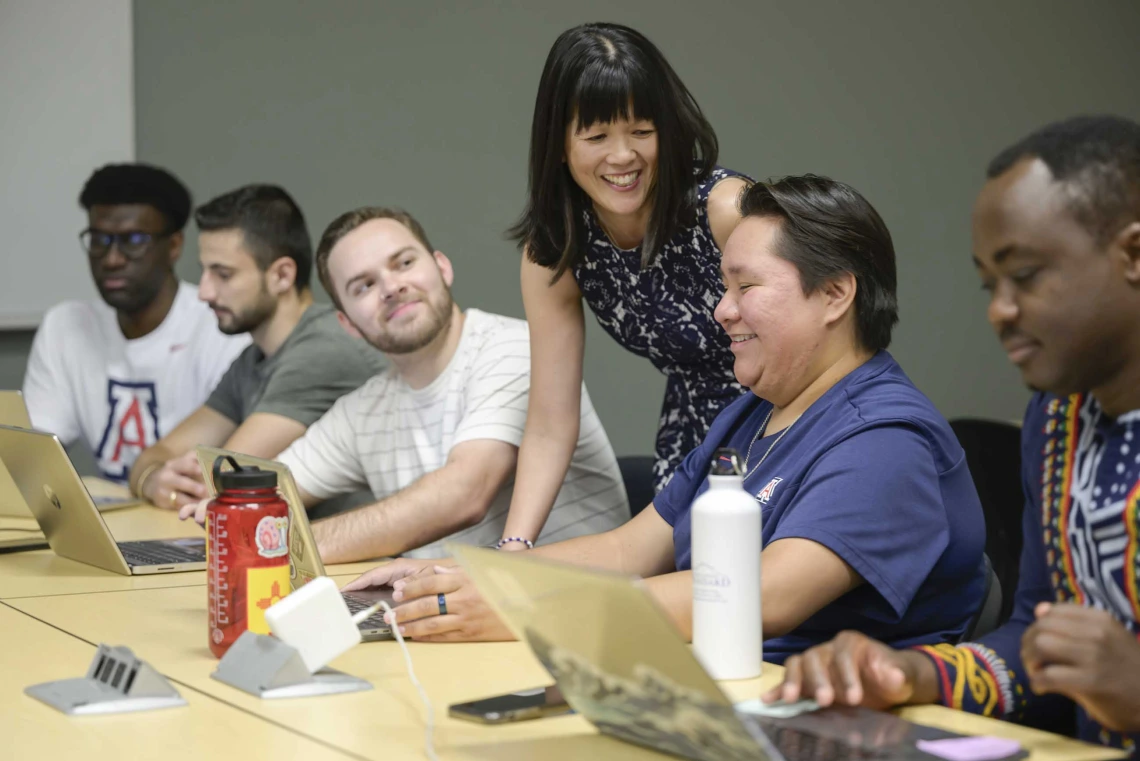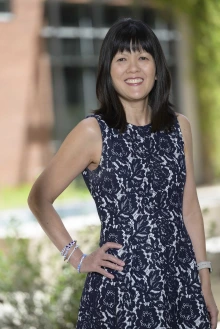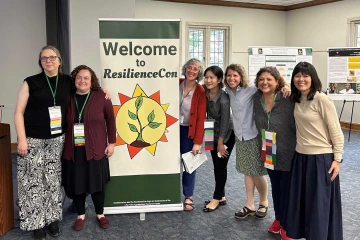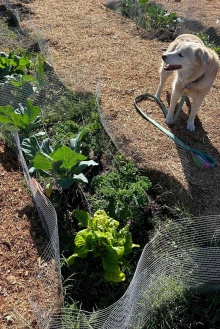Professor makes mental health, resiliency a priority for students, herself
Nicole Yuan’s research focuses on reducing stigma regarding mental health, building resilience and taking a holistic approach to teaching and mentoring.

Mel and Enid Zuckerman College of Public Health associate professor Nicole Yuan, PhD, MPH, enjoys teaching and mentoring the next generation of public health professionals.
Photo by Kris Hanning, UArizona Health Sciences Office of Communications
Nicole Yuan, PhD, MPH, lights up when talking about teaching and mentoring students.
The associate professor and program director of Health Behavior and Health Promotion in the Department of Health Promotion Sciences at the University of Arizona Mel and Enid Zuckerman College of Public Health said she takes a holistic approach to teaching, with the goal of promoting students’ academic success, health and well-being.

Nicole Yuan, PhD, MPH, joined the University of Arizona Mel and Enid Zuckerman College of Public Health in 2004.
Photo by Kris Hanning, UArizona Health Sciences Office of Communications
“Mental health and resilience of students has become a priority for me since the pandemic,” said Yuan, a trained clinical psychologist who maintains a psychology license with the Arizona Board of Psychologist Examiners even though she is not currently practicing. “It's something I’m very committed to.”
Yuan teaches two graduate-level courses, contemporary health issues and research and sociocultural and behavioral aspects of public health. In those courses, she actively promotes her students’ mental health.
“Dr. Yuan prioritizes the mental health and well-being of her students by ensuring that they get the proper movement breaks in between lectures, quizzes and presentations,” said Nathan Mottern, who took Yuan’s sociocultural and behavioral aspects of public health class. “Many of the movement breaks made me feel a lot more comfortable and prepared for engaging in discussion.”
To Yuan, a holistic approach to teaching and mentoring means creating a safe space for a student to feel comfortable sharing their thoughts and opinions, talking about what’s going on in school or with their research, and allowing them the opportunity to expand into their personal life, health and well-being, if they wish to share.
Mary Koss, PhD, a Regents Professor in the Zuckerman College of Public Health and a clinical psychologist who had an early influence on Yuan, showed Yuan that a psychologist could work in public health.
“Dr. Yuan shows a dedication to students that has grown through the years. I respect and have learned from her approach to identifying obstacles in a student’s progress, supporting them and providing concrete options to overcome obstacles,” Koss said.
An interest in public health blossoms
Yuan’s path to public health was not planned.
After earning a bachelor’s degree in biopsychology and minoring in English, Yuan worked for two years as a pregraduate research assistant at Georgetown University’s Department of Psychiatry. It was there that she developed an interest in clinical psychology, particularly trauma, interpersonal violence and adverse life experiences. She went on to complete a master’s and doctorate in clinical psychology at Bowling Green State University.
She was introduced to public health at the University of Arizona after working with Koss on a study about mental health and health disparities in which they focused on interpersonal violence and substance use in tribal communities.
“I was just really drawn to the fact that I could address mental health in a more effective way by addressing prevention, not just treatment,” Yuan said. “And I really embraced the public health values and frameworks, especially the social-ecological model, which looks not just at the individual, but at relationships, community and organizations in society to address these complex problems.”
She also wanted to find ways to reduce stigma on topics like substance use. With her interest in public health piqued, she pursued a master’s in public health at the University of Washington.
Yuan joined the UArizona Zuckerman College of Public Health in 2004. Her public health research over the years has continued to focus on addressing health disparities among both rural and urban Indigenous communities.
She has had a long-standing partnership with the Tucson Indian Center. One recent project looked at preventing alcohol-exposed pregnancies among the urban Native American and Alaskan Native population in Tucson. While the project experienced challenges with low recruitment, Yuan and the center continue to work with the community to determine the kinds of health programs it wants.
“I really embraced the public health values and frameworks, especially the social-ecological model, which looks not just at the individual, but at relationships, community and organizations in society to address these complex problems.”
Nicole Yuan, PhD, MPH
Her other public health interests focus on women and healthy aging. She is analyzing data from the Women's Health Initiative and the relationship between obesity and depression among postmenopausal women in the United States. She is also exploring different health programs and strategies that can benefit older workers, such as tai chi interventions.
Yuan said her interest in mental health comes from studying interpersonal violence and adverse life experiences, understanding how individuals cope and respond to those types of experiences and its impact on their mental health.
Over the years, her focus has shifted to resilience and a strengths-based approach after adverse or difficult life experiences. She said that the people and communities she works with are more receptive to this positive approach which helps them feel empowered, especially when the research relates to often stigmatizing issues.
Yuan is also focusing her new research on positive childhood experiences – such as spending time with family and engaging in after school and leisure activities – and how that can promote success and well-being into adulthood. Since this change in focus, Yuan said she has seen her students respond as well, including one student who included positive childhood experience measures in their dissertation on adverse childhood experiences among college students, which provided a whole picture of people’s lives.

Nicole Yuan, far right, and the ResilienceCon co-organizers in the historic Scarritt Bennett Center in Nashville, Tennessee, in April. The nontraditional conference was founded by Sherry Hamby, PhD, who is standing on the far left.
Photo by Joaquin Mariscal
Learning and sharing at ResilienceCon
For the past nine years, Yuan has been a co-chair of ResilienceCon, an international conference organized by the Life Paths Research Center and held annually in Nashville, Tennessee. ResilienceCon takes a “strengths-based approach to understanding, preventing and responding to violence and other adversities,” according to its website.
“It’s a nontraditional conference setting and the founder, Dr. Sherry Hamby, has always wanted this to be a ‘nonconference’ that is very much about interactive discussions,” Yuan said. “It’s not about people just talking about their research. It’s a lot of shared learning, a lot about lessons learned and a lot of humility in terms of how we do our work and how we work with our communities.”
The conference is multidisciplinary and draws social workers, psychologists and mental health professionals, as well as students and experts from related fields like public health, sociology and education.
From puppy love to community gardening

Chai, Nicole Yuan’s dog who passed away earlier this year, is seen here admiring Yuan’s community garden plot. Gardening is one of the ways Yuan takes care of her mental health.
Photo by Nicole Yuan
Yuan practices what she preaches. She takes care of her own mental health by doing activities and being with people who bring her joy.
“A lot of my hobbies involve my children, but dogs are also a huge passion of mine,” she said.
Sadly, Yuan lost her 14-year-old dog, Chai, in February, but her family adopted a rescue puppy not long after. She said she loves walking her dog around sunset – when Tucson’s skies are the most beautiful – and being out in nature.
She practices mindfulness meditation and gardens, beaming while mentioning the community garden plot she maintains with her mom.
Yuan, a Chinese American who was born in Switzerland, grew up in Maryland, went to college and graduate school in Ohio, and completed a clinical psychology internship in New Orleans, recently began volunteering with a group that supports Asian American initiatives in Southern Arizona.
“I’ve gotten to meet a lot of Asian American leaders in the community and learn about the community, which I really haven’t been too involved with in terms of research or in my personal life,” she said.
“I feel like a door has just opened for me to do this work more out of personal interest, but I think there will be opportunities, potentially, for research and for student engagement in the community.”
At the end of the day, mental health care is more than just research for Yuan, it is a part of her.

